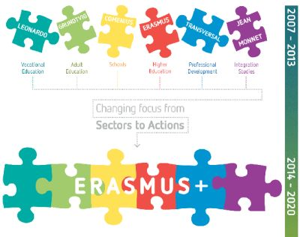Erasmus Programme
New EU Programme: Erasmus+
A new 7 year funding initiative called Erasmus + with a budget of around 16 billion Euros will support opportunities for mobility and cooperation for over 4 million people during the period 2014 to 2020, subject to negotiations within the MFF (multi-annual financial framework).
The Irish EU presidency has brokered an agreement on a new programme to support initiatives in education, training, youth and sport over the next seven years with a budget of around 16 billion Euros. The programme, called Erasmus + will integrate into one single programme all the current EU and international schemes for education, training and youth activities that were previously only available separately and will also include initiatives in sport. From the budget, subject to negotiations within the MFF (multi-annual financial framework), 77.5% will be allocated to sectors in education and training, an extra 3.5% allocated to the "Loan Guarantee Facility", while the Youth sector will receive 10%, and Sport will be allocated 1.8% of the funds.
Over 4 million people will be able to benefit from European finances to seize the opportunity to study and train abroad between 2014 and 2020, almost doubling the numbers who currently receive these supports.
The programme will focus on mobility, cooperation and policy reform. Funding opportunities will be specifically targeted at study, training, teaching and international volunteering. These improvements will benefit those in higher education and vocational schools, trainees, teachers, trainers, apprentices and youth workers.
Good practice will be shared through cross-cultural and cross-institutional learning in education and training institutions and youth organisations. These will be formally implemented through “Knowledge Alliances” at university level and through “Sector Skills Alliances” in vocational and professional institutions.
The programme provides for engagement of the private sector to foster innovation and to ensure that practical learning and education is brought to the fore.
Announcing the agreement, the Irish Minister for Education and Skills, Ruairí Quinn, T.D., said: “Ireland’s core aim during our Presidency term is to seek ways of supporting sustainable jobs and growth in Europe. With unemployment, particularly amongst young people, at very high levels across Europe, this new programme will have a key role in tackling and resolving the crisis.”
“Erasmus + will improve the employability of young people and open up new opportunities for them. Since 2007, approximately 400,000 people a year across Europe have benefited from the current programmes, and today’s development means that many more people of all ages and backgrounds will be eligible for these supports.”
The Minister noted that it is estimated that by 2020 nearly 35% of all jobs will be classified as high-skill. “We need to ensure that our young people are equipped to meet the future demands of the labour market, and that we are providing them with opportunities that will reveal their full potential,” he said.
He added finally that member state agreement on Erasmus+ represents a key achievement of the Irish presidency of the European Council.

KEY POINTS OF ERASMUS +
- Helps young people to acquire additional skills through studying & training abroad
- Enhances teaching quality in the EU and beyond
- Supports Member States and partner countries in modernising their education and vocational training systems
- Promotes youth participation in society
- Supports teaching and research on European integration
- Supports popular European sports
Who will benefit from Erasmus+?
- Up to 4 million people will benefit from EU grants for education & training opportunities abroad between 2014 and 2020, which is nearly double the number who are currently eligible for these supports
How Erasmus+ will make a difference
- More opportunities for higher education and vocational students to study and train abroad to improve their skills and job prospects;
- More opportunities for teachers, trainers and youth workers to study and train in another country;
- More opportunities for young people to learn through youth exchanges, volunteering and participation in democratic life;
- More opportunities for education and training institutions to exchange good practice;
- Increased cooperation between educational institutions, businesses or regional authorities and other bodies such as youth organisations;
- Launch of new ‘Knowledge Alliances’ between higher education institutions and businesses;
- Expanding the eTwinning initiative that connects schools via the internet;
- Better cooperation in education policy, with an emphasis on practical outcomes such as the Europass CV, which is used by more than 10 million Europeans;
- More support for higher education in other parts of the world, particularly in neighbouring countries.
http://eacea.ec.europa.eu/llp/
http://www.programmallp.it/llp_home.php?id_cnt=1

